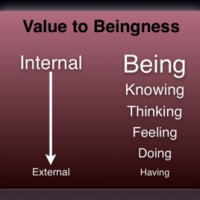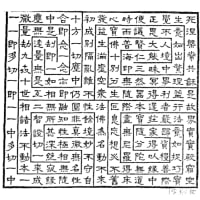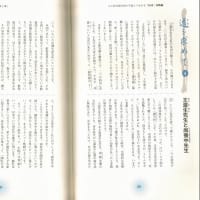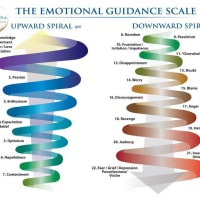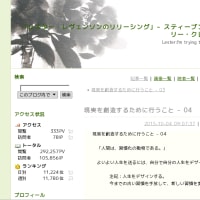page=32 - あなたの富の作り手 (あなたの富ビルダー)
page=32
get more out of it. But, just as importantly, keep releasing on your unwanted habit while you’re doing it, before you’re doing it, and after you do it.
Also, unless you’re under medical supervision, or it runs contrary to the rules of the 12- step program you’re working, experiment with making a pact with yourself that it’s okay to indulge your habit after releasing the feelings that are motivating you to do it. In making it okay, it will become more and more okay to not do it―and the habit will drop away.
Chapter 16 - Your Wealth Builder
16章 - あなたの富の作り手 (第16章 - あなたの富ビルダー)
Welcome to your mini-course on financial freedom and abundance. In this chapter, we’ll explore several exercises that will help you to apply the Sedona Method to increasing your prosperity. Each exercise is designed for frequent and repeated use, so that you can gain increasingly more from it. The exercises build on the foundation of the material in Part One, so if you haven’t completed Part One of this book yet, please return to this chapter once you have, even if this is a key area of interest for you.
金融自由および有り余るほどの量上のあなたのミニコースへようこそ。
本章では、私たちは、あなたがあなたの繁栄を増加させることにシドナ・メソッドを適用するのを助けるいくつかの練習を調査するでしょう。
練習はそれぞれ頻繁および反復使用のために設計されています。その結果、それでますますもっと利益を得ることができます。
練習は、資料の基礎に一部分基礎を置きます、1、したがって、この本のパーツ1をまだ完成していない場合、一旦これがあなたのための重要な関心分野でも、持てば、本章に返ってください。
(財政的な自由と多量の上であなたの短期コースにようこそ。
この章では、我々は、あなたがSedona Methodをあなたの繁栄を増やすことに適用するのを助けるいくつかのエクササイズを調査します。
各々の運動は頻繁で度重なる使用のために設計されます、そのため、あなたはよりますますそれによって利益を得ることができます。
エクササイズはパート1で材料の基盤を基にしているので、あなたがまだこの本のパート1を完成させなかったならば、たとえこれがあなたのための関心の重要な領域であるとしても、かつてあなたが持っているこの章に戻ってください。)
Increased wealth is one of th participants and those who listen to our audio programs. As we release on any area in life, we naturally become more positive and therefore tend to attractDEだ完成していない場合%A more abundance into our lives. Of course, abundance is not only financial. But the world runs―maybe a little too much―around money, so most of us feel varying degrees of intensity around the topic of our finances. When we begin to let go of our beliefs in this area, we find it easier to receive, have, and even save more money.
増加した富は、私たちがセミナー参加者から便りをもらう、最も一般に報告される利点のうちの1つ、および私たちのオーディオ・プログラムを聞く人々です。
上にこの世でどんなエリアもリリースするとともに、私たちは当然より肯定的になり、したがって、私たちの生命へより多くの有り余るほどの量を引きつける傾向があります。
もちろん、有り余るほどの量は単に金融ではありません。
しかし世界、少し金銭多くのまわりで実行恐らく、したがって、私たちのうちのほとんどは、私たちの財源のトピックのまわりの強度の変わる程度を感じます。
このエリアに対する確信を手放し始める場合、私たちはより多くのお金を受け取り、持ち、さらに保存することはより簡単であると分かります。
(増加した富は、我々がセミナー参加者から聞かされる最も一般に報告された利益の1つと我々の音声プログラムを聞く人々です。
人生におけるどんな地域ででもリリースして、我々は当然よりポジティブになって、したがって命により多くの多量を引きつける傾向があります。
当然のことながら、多量は金融商品だけでなくあります。
少しばかり多分世界runs―以外の、お金のあたりのmuch―それで、我々のほとんどは、我々の資金の話題のまわりで、程度の異なる強さを感じるでしょう。
この地域で信条を捨て始めるとき、我々はより多くのお金を受領して、持っていて、節約さえすることがより簡単であるとわかります。)
Like many people, I used to believe that it was somehow unspiritual to possess money. So, I had a tendency to spend what I did receive, and I wouldn’t allow myself to earn what I deserved. Since I began using the Method to let go of this belief, I have experienced increasing abundance in every area of my life, not solely financially.
多くの人々のように、私は、お金を所有することがどうも非精神的だったと思っていたものです。
それで、私には受けたものを費やす傾向がありました、そして、私は自分自身が私が値したものを得るのを許しません。
この信念を捨てるために方法を使用し始めたので、単に財政的にだけでない、私は増加している多量を人生のあらゆる領域に感じました。
(多くの人々のように、私は、金銭を所有することがなんとかして精神的でないとかつては信じました。
したがって、私には、私が受け取ったものを費やす傾向がありました。また、私は、私自身が、私が相当したものを得ることを認めません。
この確信を手放すメソッドを使用し始めて以来、私は生活のすべてのエリアの中の増加する有り余るほどの量を単独で財政的でなく経験しました。
)
Bank in the Bank, Not in Your Head
あなたの頭の中のではない銀行の銀行 (銀行の銀行(あなたの頭でないことの))
Lust is an emotional state in which we hold ourselves back from having what we want, often without even realizing it. As described in the Introduction, when I was selling real estate, I was “head banking” instead of banking in the bank. When I ultimately allowed myself to let go of the lust that was causing me to fantasize about how great it was going to be to make sales, and just went about the business of making sales, I closed many more deals. Salespersons, marketers, entrepreneurs, and managers are very prone to head banking. However, they are definitely not the only ones. Another notorious place many people tend to slip into head banking is in the area of investing.
渇望は、それをしばしばさえ実現せずに、私たちが望むものを持っていることから、私たちが私たち自身を阻止する感情の状態です。
序論で記述されるように、不動産を売っていたとき、私は銀行の銀行業務の代わりに「先頭の銀行業務」でした。
最後に私にセールスを作ることはなんてすばらしくなっただろうことを夢見させていた欲望を捨てるのを自分自身が許して、ちょうどセールスを作るビジネスをしたとき、私はより多くの取引を終えました。
販売員、マーケター、企業家とマネージャーは、非常に銀行業務の先頭にたちやすいです。
しかし、彼らは確かにただ一人の人でありません。
多くの人々が先頭の銀行業務の中にすべり込ませる傾向があるもう一つの悪名高い場所は、投資することではあります。
You may have heard an expression referring to investing: “The bulls and the bears make money, but the pigs get slaughtered.” A secret lies behind this maxim, with which you may have direct experience. Most investment decisions are emotionally based, as opposed to being based on solid facts and clear intuition. Unsuccessful investors, and even some successful ones, often begin counting their gains and losses before a transaction is actually closed. They count their paper profits and spend them mentally before the actual results come in. They also tend to stay in a transaction longer than they should, because it might get better. Both of these actions are due to lust and its inherent substitution of fantasy for what is. If you are this type of investor, you can let go of your lust instantaneously by determining which want is involved in it: approval, control, or security. As you do, you’ll make wiser investment decisions.
表現が次のものを投資することを指すのを聞いたかもしれません:
「雄牛と熊は利益を出します。しかし、ブタが虐殺されます。」
秘密はこの格言の背後にあります。それで直接の経験を持っているかもしれません。
ほとんどの投資決定は、確固たる事実および明瞭な直観に基づくことに対立するものとして、情緒的に基づきます。
失敗の投資者、そしてある成功した人さえ、処理が実際にある前に、しばしばそれらの収益と損失を数え始める、閉じました。
それらは架空利益を数えて、実際の結果が中へ入る前に、それらを精神的に費やします。
さらに、それがよくなるかもしれないので、それらはそれらがするべきであるより長い処理でとどまる傾向があります。
これらのアクションは両方とも、渇望、およびあるものに対する空想のその固有の代用によります。
この種の投資者ならば、どの欲求(注記:基本的な欲求)がそれ(渇望)に関係するか決めることにより渇望を瞬間的に手放すことができます:
承認、制御あるいは安全 (注記:基本的な欲求)。
そうして、あなたはより賢明な投資決定をするでしょう。
Fear is also part of the problem of emotional investing. People often don’t act on what they intuitively know is correct in the market, because they’re afraid of making mistakes. Or fear paralyzes them and prevents them from taking their profits or cutting their losses. So, if you find that you are getting caught in fear-based investing, allow yourself to let it go directly, or see it as one of the wants and let it go in that way.
恐れは、感情的な投資の問題の一部でもあります。
彼らは間違いをするのが怖いので、彼らが何が市場に出ていて正しいということを直観的に知っているかについて、人々はしばしば作用しません。
または、恐れは彼らを麻痺させて、彼らが彼らの利益をとるか、彼らの損失を切るのを防ぎます。
それで、あなたが恐れベースの投資を見つけられているとわかるならば、自分自身が直接ほっておくのを許してください、さもなければ、それを必要とする物の1つとみなして、そのようにほっておいてください。
“Without reservation, I can state that the Sedona Method works! I originally set a goal of organizing my finances. After releasing it, I found that my real goal was to allow myself to know my own value. In the next three weeks, I did more about my finances than I had in the previous eight months.”―Noel Kelly, Broomall, PA
A third big way that many investors fool themselves into believing that they are more in control than they are is to call the moves after the fact and tell themselves that they knew what was going to happen. They can often be much better “paper traders” than real ones. They make the wrong decisions when they are actually using cash. Again, it’s the emotions coloring our perceptions that cause us to do things we regret later.
多くの投資家が自分自身をだまして彼らが彼らより管理していると思っていることをさせる第3の大きい方法は、動きと事実にちなんで命名して、彼らが何がありそうかについてわかっていたと自分に言い聞かせることです。
彼らは、しばしば、本当のものより非常に良い「紙トレーダー」でありえます。
実は現金を使っているとき、彼らは間違った決定をします。
また、我々に我々が後で残念に思うことをさせる我々の認識に色をつけることは、感情です。
If you allow yourself to release before you enter or leave a business deal or stock transaction, you will find that your timing improves. If you also let go before you act when you have a hunch, you will be able to tell the difference between intuition and fear or greed. The more you use the Method in your investment activities, the more you will find yourself following fact instead of fancy, and intuition rather than lust and fear.
Releasing on Your Parents’ Financial Activities
あなたの両親の財政的な活動に関してリリースすること
In considering abundance and financial freedom, one of the areas where most people get stuck is resisting or wanting to change how their parents viewed and handled money. Now, this might seem obvious, or it might come as a surprise to you. Most of us either strongly model ourselves after our parents’ financial viewpoint―whether it worked for them or not―or we live in resistance to it. Either way, it totally obscures our own power to create what we want in life. It also holds us back from having what we want.
多量と財政的な自由を考慮する際に、大部分の人々が動けない地域の1つは、彼らの両親がお金を見て、取り扱った方法に抵抗しているか、変えたくなっています。
現在、これは明らかなようかもしれません、または、それはあなたにとっての驚きとして来るかもしれません。
それが彼らのために働いた、または、not―または我々がそれに対する抵抗で生きるかどうかにかかわらず、我々のほとんども我々の両親の財政的な視点―にならって自分自身を強く作ります。
いずれの方法でも、それは、我々が人生で欲しいものをつくる我々自身の力を全く不明瞭にします。
それも、我々が欲しいものを持つことから、我々をためらわせます。
A Sedona Method student named Nancy made a major discovery in this regard one day when she was listening to my audiotape program on financial freedom. As she says, “A pirate has downloaded some software into my operating system. It’s a continuous loop that keeps repeating the message: ‘Money is scarce.’ I hadn’t realized before how deeply I’d adopted my parents attitudes about money. So much so that I recreate them in my life.
彼女は経済的自由の私のオーディオテーププログラムを聴いたときにナンシーというセドナメソッドの学生は一日、この点に大きな発見をしました。彼女が言うように、"海賊は私のオペレーティングシステムにいくつかのソフトウェアをダウンロードした。それは、メッセージを繰り返し続けて連続ループです: '。マネーが不足しているが'私はお金についての私の両親の態度を採用したと思いますどのように深く前に実現していなかった。あまりにも多いので、私は私の人生でそれらを再作成すること。
(ナンシーという名のsedona方法学生は金融自由に関する私のオーディオテープ・プログラムを彼女が聞いていたある日この点に関して主な発見をしました。
「彼女が言うように、著作権侵害者は私のオペレーティング・システムへあるソフトウェアをダウンロードしました。
メッセージを繰り返し続けるのは連続的なループです:
「お金が不足します。」
私がどれくらい深く持ったかが金銭に関する私の親態度を受け入れる前に、私は実現していませんでした。
私がそれらを一生のうち休養させるほど。)
“My mother is financially set, yet she worries constantly that she won’t have enough. Of course, her attitude goes back further, to my grandparents. It’s a farmer’s mentality. There’s secrecy about money. You must act poor even if you’re not poor. You are not supposed to ‘brag’ about being successful. So I work on commission, and it’s either feast or famine. I can see now that I’ve created a pattern on purpose of almost succeeding and then pulling back. I’m feeling freer though, now that I release on it.”
"私の母は、財政的に設定され、まだ彼女は十分に持っていないことを常に心配している。もちろん、彼女の態度は私の祖父母に、さらにさかのぼる。それは農家の考え方だ。お金についての秘密があります。あなたが悪いでなくてもあなたが悪い行動しなければならない。あなたが成功したことについて'自慢'することになっていません。だから私は、委員会で作業、そしてそれはごちそうや飢饉のどちらかだ。私は今、私はほとんど成功してから引き戻すの目的上のパターンを作成したことがわかります。私はそれをリリースする今こと、しかし自由に感じている。"
(「母は財政的に配置されます、それでも、彼女は十分を持たないことを絶えず心配します。
当然のことながら、私の祖父母にとって、彼女の態度は、より遠くに戻ります。
それは、農民の心理です。
秘密が、お金についてあります。
たとえ貧しくないとしても、あなたは貧しいふりをしなければなりません。
成功していることについての‘ブラッグ』べきではありません。
それで、私は委託されて働きます、そして、それはどちらの豪華な食事または飢饉でもあります。
ほとんど成功して、それから退く目的に関してパターンをつくった今、私はわかることができます。
それの上でリリースする今、しかし、私はより自由であると感じています。」)
So, consider your parents’ attitudes about money, how they treated you in relationship to money, and how they treated each other.
Then ask: Is there anything about your parents’ attitudes and their actions with money that you would either like to change or which you’re resisting?
Could you let go of wanting to change or resist the way they were, or they are?
Find something else that you resist about the way your parents handled money or their attitudes about money.
Could you let go of that resistance now? Could you just allow it to dissolve?
Now, think of something else that you’d like to change about how your parents handled money, what happened to them in relationship to money, or how they treated you in relationship to money.
Could you let go of wanting to change it?
Repeat the questions above a few more times before moving on.
Did your parents have a negative pattern related to money that you’ve imitated without even realizing it―a pattern you’ve adopted in your own life?
If so, could you welcome that attitude, belief, or habitual pattern?
Does it come from wanting approval, control, or security? Whichever want it is: Could you allow yourself to let it go?
Is there any other way that you’ve modeled your finances after your parents’ that you don’t like and would like to change?
Just for now, could you simply welcome it?
Could you let go of wanting to change it? Could you let go of wanting to imitate your parents?
As I mentioned in the chapter on guilt and shame, during the first few years of our lives―and as we’re growing up―our parents are like gods to us. They feed us, house us, and clothe us, and we unconsciously model ourselves after them, even if what they are doing doesn’t work well.
Check now to see if you’ve become aware of that kind of past unconscious modeling right now.
If so, could you just allow it to be?
Is there a sense of wanting approval, control, or security? If so, could you allow that want to release?
承認、制御、またはセキュリティを望む感はありますか?もしそうなら、あなたは解放することが可能だろうか?
(承認、コントロールあるいはセキュリティを望む感覚がありますか。
そうならば、その欠乏がリリースすることを認めていただけませんか。)
Now, check again to see whether there is any way that you’re resisting your parents’ attitudes about money and want to change them. Or are you modeling yourself after your parents in some regard?
すぐに、あなたがお金についてあなたの両親の態度に抵抗していて、彼らを変えたい方法があるかどうか見るために、もう一度チェックしてください。
または、あなたはなんらかの関係で両親にならって自分自身を作っていますか?
(さて、両親の金銭に関する姿勢に抵抗し、それらを変更したい方法があるかどうか確かめるために再びチェックしてください。
あるいは、ある注意中の両親を手本にしていますか。)
Could you just allow that to be, to welcome it?
それがそうであることをそれを歓迎するためにちょっと認めていただけませんか?
(それを歓迎するために、あるために、ちょうどそれを許してもらえますか?)
Does it come from wanting approval, control, or security? Could you allow yourself to let that go?
それは、承認、制御、またはセキュリティを望むから来るのでしょうか?あなた自身がそれを手放すことができてもらえますか?
Take a moment to notice how you feel right now after releasing. This is an incredibly valuable topic for additional exploration. Furthermore, it’s entirely possible to become free of the beliefs and attitudes your parents had about money that are holding you back. You can be the way you choose now. You don’t have to be the way they wanted you to be anymore, and you do not need to live in resistance to the way they were. The key is to let go of your resistance (the sense of wanting to change what was or what is), and to let go of wanting to be like your parents in order to be safe or to get their approval.
あなたがどのようにたった今、リリースすることを探るか気がつく時間をとってください。
これは、さらなる探査の信じられないほど価値ある話題です。
さらにまた、あなたの両親があなたをためらわせているお金についてとった信条と態度がなくなることは、十分にあり得ます。
あなたは、現在選ぶ方法でありえます。
あなたは彼らがあなたがもうそうであることを望んだ方法である必要はありません、そして、あなたは彼らがそうであった方法に対する抵抗で生きる必要はありません。
キーはあなたの抵抗を捨てることになっています(変わりたいどうですかという感覚がそうでありました、または、何)、そして、安全であるためにあなたの親らしいか、彼らの賛成を得たいことを放すこと。
Releasing Fear about Money
金銭に関する恐れのリリース (お金について恐れをリリースすること)
Another area in which we get stuck in relationship to money―actually in relationship to everything―is the area of fear. If you remember from Chapter 13, The Secret of Letting Go of Fear and Anxiety, anything of which we’re afraid we subconsciously want to have happen. There is a pull in that negative direction without us purposely wanting or being aware of it. Consider your personal fears about money. Most of us have had things happen to us in the past that we didn’t like, or to those we know, in relationship to money. We therefore want to avoid or prevent these experiences from happening again, which, of course, means that we’re holding them in mind. Since I am sure you would prefer to let that whole expectation go out of your consciousness, rather than pulling it into your experience, let’s explore the issues together.
My parents grew up during the Depression, and my father saw his family lose their house. My mother tried to persuade my father to own real estate with little success. As a real estate broker, he earned a good living off commissions and made other people millions of dollars on their deals. But he passed up many real estate purchases that he could have made for himself, which would have returned him millions of dollars on very small investments. In fact, he sometimes rented our homes, even though he could have afforded to buy them and could have sold them soon afterwards for a considerable profit. Without realizing it, I modeled after my father in this area. My wife Amy actually had to cajole me for a few years before I realized what was happening, and I released my fear of owning real estate. We then bought a townhouse in Phoenix that we sold at a profit. Now we own a beautiful home in Sedona, Arizona. I know this wouldn’t have been possible for us if I hadn’t let go of the fear of owning real estate that I’d inherited from my father.
What is something that you’re afraid will happen if you have a lot of money, or if you have financial freedom? Perhaps you fear being audited by the IRS, paying higher taxes, or making bad investments.
Whatever fear it is: Could you, just for now, let go of wanting that to happen? I know it is a funny notion, but, as we’ve seen in other chapters, it does work.
What else are you afraid might happen if you have a lot of money in the bank?
Might you take it for granted?
Are you afraid it will damage your relationships?
Check to see what your fears are about having lots of money or having financial freedom, and pick any one of them.
Could you let go of wanting that to happen?
“The gains I’ve received and continue to receive seem to be increasing without any additional effort, like hitting a critical mass! Before taking the course, I never received production bonus money at work. Upon completion, I received my first bonus. Then they continued every month, including three awards for being the top producer. Then the managers were asking me how to motivate others to do the same!”―Peter Piezzo, St. Augustine, FL
Find something else that you’re afraid will happen if you have complete financial freedom and abundance. Maybe you’re afraid that you won’t handle money responsibly.
あなたは、完全な経済的自由と豊かさを持っている場合、恐れが起こるしていることを何か他のものを検索します。たぶん、あなたは、あなたが責任を持ってお金を処理しないことを恐れている。
Could you let go of wanting that to happen?
それが起こることを望むのを手放しますか?
Repeat the questions above several more times, allowing your fears to dissipate.
あなたの恐れが消えることを可能にして、さらに数回上記の質問を繰り返します。
In addition to using the shortcut of letting go of wanting your fear to become real, you could also make a list of your fears about money, abundance, and financial freedom and release on them directly using the wanting approval, control, and security questions. Either way, as you eliminate the fear, you’ll be freer to move forward and create exactly the kind of abundance you want in your life.
あなたの恐れに本当になって欲しいことを放す近道を使用することに加えて、あなたは欲しくなっている承認、支配とセキュリティ質問を使っているお金(多量)と財政的な自由とリリースについての恐れのリストを直接彼らの上で作成することもできました。
いずれの方法でも、恐れを除いて、あなたは前進してより結構で、正確に人生で望むそういう多量をつくります。
Likes and Dislikes about Money
お金についての好き嫌い
Our beliefs and attitudes about money frequently block us from having financial freedom and abundance. Many of these are like the air we breathe: we’re totally unaware of them and the attachments and aversions hidden beneath them. Using the Likes/Dislikes Process (see Chapter 9) helps bring these layers into full awareness where we can release them.
お金についての我々の信念(信条)と態度は、我々が財政的な自由と多量(豊かさ)を持つのをしばしば妨害します。
これらの多くは、我々が呼吸する空気のようです:
我々は、彼らの下で隠される彼らと執着と嫌悪を全く知りません。
我々が彼らを解放することができる完全な認識にこれらの層を持ってくるのを、好き/嫌いプロセス (Likes/Dislikes Process)(第9章を見ます)を使うことは、助けます。
As you work on your beliefs and attitudes, I’ll ask you to do it in two stages. Begin with your current financial situation. Think how you are right now in relationship to money. Remember, it’s important to release on your likes as well as your dislikes.
あなたが信念(信条)と態度に取り組んで、私はあなたに2つの段階にそれをするようお願いします。
あなたの現在の財政的な状況から始めてください。
あなたがどのようにたった今お金との関係にあるかについて考えてください。
思い出してください。それはあなたの好みならびにあなたの嫌いの上でリリースにとって重要です。
What is something that you like about your current financial situation?
あなたの現在の財政状況について、あなたが好きなものは何ですか?
(現在の金融情勢に関して好きなものは何ですか。)
Does that come from wanting approval, control, or security/survival?
それは承認、制御あるいは安全/存続を望むことから来ますか?
Whichever want it is: Could you just let it go?
欲求がどれでも、それは次のとおりです:あなたはそれを手放すだろうか?
It might be hard to think of things you like, especially if your financial situation isn’t the way yo
それはあなたの財政状況はあなたの方法ではない場合は特に、あなたが好きなものを考えるのは難しいかもしれない
page=32
get more out of it. But, just as importantly, keep releasing on your unwanted habit while you’re doing it, before you’re doing it, and after you do it.
Also, unless you’re under medical supervision, or it runs contrary to the rules of the 12- step program you’re working, experiment with making a pact with yourself that it’s okay to indulge your habit after releasing the feelings that are motivating you to do it. In making it okay, it will become more and more okay to not do it―and the habit will drop away.
Chapter 16 - Your Wealth Builder
16章 - あなたの富の作り手 (第16章 - あなたの富ビルダー)
Welcome to your mini-course on financial freedom and abundance. In this chapter, we’ll explore several exercises that will help you to apply the Sedona Method to increasing your prosperity. Each exercise is designed for frequent and repeated use, so that you can gain increasingly more from it. The exercises build on the foundation of the material in Part One, so if you haven’t completed Part One of this book yet, please return to this chapter once you have, even if this is a key area of interest for you.
金融自由および有り余るほどの量上のあなたのミニコースへようこそ。
本章では、私たちは、あなたがあなたの繁栄を増加させることにシドナ・メソッドを適用するのを助けるいくつかの練習を調査するでしょう。
練習はそれぞれ頻繁および反復使用のために設計されています。その結果、それでますますもっと利益を得ることができます。
練習は、資料の基礎に一部分基礎を置きます、1、したがって、この本のパーツ1をまだ完成していない場合、一旦これがあなたのための重要な関心分野でも、持てば、本章に返ってください。
(財政的な自由と多量の上であなたの短期コースにようこそ。
この章では、我々は、あなたがSedona Methodをあなたの繁栄を増やすことに適用するのを助けるいくつかのエクササイズを調査します。
各々の運動は頻繁で度重なる使用のために設計されます、そのため、あなたはよりますますそれによって利益を得ることができます。
エクササイズはパート1で材料の基盤を基にしているので、あなたがまだこの本のパート1を完成させなかったならば、たとえこれがあなたのための関心の重要な領域であるとしても、かつてあなたが持っているこの章に戻ってください。)
Increased wealth is one of th participants and those who listen to our audio programs. As we release on any area in life, we naturally become more positive and therefore tend to attractDEだ完成していない場合%A more abundance into our lives. Of course, abundance is not only financial. But the world runs―maybe a little too much―around money, so most of us feel varying degrees of intensity around the topic of our finances. When we begin to let go of our beliefs in this area, we find it easier to receive, have, and even save more money.
増加した富は、私たちがセミナー参加者から便りをもらう、最も一般に報告される利点のうちの1つ、および私たちのオーディオ・プログラムを聞く人々です。
上にこの世でどんなエリアもリリースするとともに、私たちは当然より肯定的になり、したがって、私たちの生命へより多くの有り余るほどの量を引きつける傾向があります。
もちろん、有り余るほどの量は単に金融ではありません。
しかし世界、少し金銭多くのまわりで実行恐らく、したがって、私たちのうちのほとんどは、私たちの財源のトピックのまわりの強度の変わる程度を感じます。
このエリアに対する確信を手放し始める場合、私たちはより多くのお金を受け取り、持ち、さらに保存することはより簡単であると分かります。
(増加した富は、我々がセミナー参加者から聞かされる最も一般に報告された利益の1つと我々の音声プログラムを聞く人々です。
人生におけるどんな地域ででもリリースして、我々は当然よりポジティブになって、したがって命により多くの多量を引きつける傾向があります。
当然のことながら、多量は金融商品だけでなくあります。
少しばかり多分世界runs―以外の、お金のあたりのmuch―それで、我々のほとんどは、我々の資金の話題のまわりで、程度の異なる強さを感じるでしょう。
この地域で信条を捨て始めるとき、我々はより多くのお金を受領して、持っていて、節約さえすることがより簡単であるとわかります。)
Like many people, I used to believe that it was somehow unspiritual to possess money. So, I had a tendency to spend what I did receive, and I wouldn’t allow myself to earn what I deserved. Since I began using the Method to let go of this belief, I have experienced increasing abundance in every area of my life, not solely financially.
多くの人々のように、私は、お金を所有することがどうも非精神的だったと思っていたものです。
それで、私には受けたものを費やす傾向がありました、そして、私は自分自身が私が値したものを得るのを許しません。
この信念を捨てるために方法を使用し始めたので、単に財政的にだけでない、私は増加している多量を人生のあらゆる領域に感じました。
(多くの人々のように、私は、金銭を所有することがなんとかして精神的でないとかつては信じました。
したがって、私には、私が受け取ったものを費やす傾向がありました。また、私は、私自身が、私が相当したものを得ることを認めません。
この確信を手放すメソッドを使用し始めて以来、私は生活のすべてのエリアの中の増加する有り余るほどの量を単独で財政的でなく経験しました。
)
Bank in the Bank, Not in Your Head
あなたの頭の中のではない銀行の銀行 (銀行の銀行(あなたの頭でないことの))
Lust is an emotional state in which we hold ourselves back from having what we want, often without even realizing it. As described in the Introduction, when I was selling real estate, I was “head banking” instead of banking in the bank. When I ultimately allowed myself to let go of the lust that was causing me to fantasize about how great it was going to be to make sales, and just went about the business of making sales, I closed many more deals. Salespersons, marketers, entrepreneurs, and managers are very prone to head banking. However, they are definitely not the only ones. Another notorious place many people tend to slip into head banking is in the area of investing.
渇望は、それをしばしばさえ実現せずに、私たちが望むものを持っていることから、私たちが私たち自身を阻止する感情の状態です。
序論で記述されるように、不動産を売っていたとき、私は銀行の銀行業務の代わりに「先頭の銀行業務」でした。
最後に私にセールスを作ることはなんてすばらしくなっただろうことを夢見させていた欲望を捨てるのを自分自身が許して、ちょうどセールスを作るビジネスをしたとき、私はより多くの取引を終えました。
販売員、マーケター、企業家とマネージャーは、非常に銀行業務の先頭にたちやすいです。
しかし、彼らは確かにただ一人の人でありません。
多くの人々が先頭の銀行業務の中にすべり込ませる傾向があるもう一つの悪名高い場所は、投資することではあります。
You may have heard an expression referring to investing: “The bulls and the bears make money, but the pigs get slaughtered.” A secret lies behind this maxim, with which you may have direct experience. Most investment decisions are emotionally based, as opposed to being based on solid facts and clear intuition. Unsuccessful investors, and even some successful ones, often begin counting their gains and losses before a transaction is actually closed. They count their paper profits and spend them mentally before the actual results come in. They also tend to stay in a transaction longer than they should, because it might get better. Both of these actions are due to lust and its inherent substitution of fantasy for what is. If you are this type of investor, you can let go of your lust instantaneously by determining which want is involved in it: approval, control, or security. As you do, you’ll make wiser investment decisions.
表現が次のものを投資することを指すのを聞いたかもしれません:
「雄牛と熊は利益を出します。しかし、ブタが虐殺されます。」
秘密はこの格言の背後にあります。それで直接の経験を持っているかもしれません。
ほとんどの投資決定は、確固たる事実および明瞭な直観に基づくことに対立するものとして、情緒的に基づきます。
失敗の投資者、そしてある成功した人さえ、処理が実際にある前に、しばしばそれらの収益と損失を数え始める、閉じました。
それらは架空利益を数えて、実際の結果が中へ入る前に、それらを精神的に費やします。
さらに、それがよくなるかもしれないので、それらはそれらがするべきであるより長い処理でとどまる傾向があります。
これらのアクションは両方とも、渇望、およびあるものに対する空想のその固有の代用によります。
この種の投資者ならば、どの欲求(注記:基本的な欲求)がそれ(渇望)に関係するか決めることにより渇望を瞬間的に手放すことができます:
承認、制御あるいは安全 (注記:基本的な欲求)。
そうして、あなたはより賢明な投資決定をするでしょう。
Fear is also part of the problem of emotional investing. People often don’t act on what they intuitively know is correct in the market, because they’re afraid of making mistakes. Or fear paralyzes them and prevents them from taking their profits or cutting their losses. So, if you find that you are getting caught in fear-based investing, allow yourself to let it go directly, or see it as one of the wants and let it go in that way.
恐れは、感情的な投資の問題の一部でもあります。
彼らは間違いをするのが怖いので、彼らが何が市場に出ていて正しいということを直観的に知っているかについて、人々はしばしば作用しません。
または、恐れは彼らを麻痺させて、彼らが彼らの利益をとるか、彼らの損失を切るのを防ぎます。
それで、あなたが恐れベースの投資を見つけられているとわかるならば、自分自身が直接ほっておくのを許してください、さもなければ、それを必要とする物の1つとみなして、そのようにほっておいてください。
“Without reservation, I can state that the Sedona Method works! I originally set a goal of organizing my finances. After releasing it, I found that my real goal was to allow myself to know my own value. In the next three weeks, I did more about my finances than I had in the previous eight months.”―Noel Kelly, Broomall, PA
A third big way that many investors fool themselves into believing that they are more in control than they are is to call the moves after the fact and tell themselves that they knew what was going to happen. They can often be much better “paper traders” than real ones. They make the wrong decisions when they are actually using cash. Again, it’s the emotions coloring our perceptions that cause us to do things we regret later.
多くの投資家が自分自身をだまして彼らが彼らより管理していると思っていることをさせる第3の大きい方法は、動きと事実にちなんで命名して、彼らが何がありそうかについてわかっていたと自分に言い聞かせることです。
彼らは、しばしば、本当のものより非常に良い「紙トレーダー」でありえます。
実は現金を使っているとき、彼らは間違った決定をします。
また、我々に我々が後で残念に思うことをさせる我々の認識に色をつけることは、感情です。
If you allow yourself to release before you enter or leave a business deal or stock transaction, you will find that your timing improves. If you also let go before you act when you have a hunch, you will be able to tell the difference between intuition and fear or greed. The more you use the Method in your investment activities, the more you will find yourself following fact instead of fancy, and intuition rather than lust and fear.
Releasing on Your Parents’ Financial Activities
あなたの両親の財政的な活動に関してリリースすること
In considering abundance and financial freedom, one of the areas where most people get stuck is resisting or wanting to change how their parents viewed and handled money. Now, this might seem obvious, or it might come as a surprise to you. Most of us either strongly model ourselves after our parents’ financial viewpoint―whether it worked for them or not―or we live in resistance to it. Either way, it totally obscures our own power to create what we want in life. It also holds us back from having what we want.
多量と財政的な自由を考慮する際に、大部分の人々が動けない地域の1つは、彼らの両親がお金を見て、取り扱った方法に抵抗しているか、変えたくなっています。
現在、これは明らかなようかもしれません、または、それはあなたにとっての驚きとして来るかもしれません。
それが彼らのために働いた、または、not―または我々がそれに対する抵抗で生きるかどうかにかかわらず、我々のほとんども我々の両親の財政的な視点―にならって自分自身を強く作ります。
いずれの方法でも、それは、我々が人生で欲しいものをつくる我々自身の力を全く不明瞭にします。
それも、我々が欲しいものを持つことから、我々をためらわせます。
A Sedona Method student named Nancy made a major discovery in this regard one day when she was listening to my audiotape program on financial freedom. As she says, “A pirate has downloaded some software into my operating system. It’s a continuous loop that keeps repeating the message: ‘Money is scarce.’ I hadn’t realized before how deeply I’d adopted my parents attitudes about money. So much so that I recreate them in my life.
彼女は経済的自由の私のオーディオテーププログラムを聴いたときにナンシーというセドナメソッドの学生は一日、この点に大きな発見をしました。彼女が言うように、"海賊は私のオペレーティングシステムにいくつかのソフトウェアをダウンロードした。それは、メッセージを繰り返し続けて連続ループです: '。マネーが不足しているが'私はお金についての私の両親の態度を採用したと思いますどのように深く前に実現していなかった。あまりにも多いので、私は私の人生でそれらを再作成すること。
(ナンシーという名のsedona方法学生は金融自由に関する私のオーディオテープ・プログラムを彼女が聞いていたある日この点に関して主な発見をしました。
「彼女が言うように、著作権侵害者は私のオペレーティング・システムへあるソフトウェアをダウンロードしました。
メッセージを繰り返し続けるのは連続的なループです:
「お金が不足します。」
私がどれくらい深く持ったかが金銭に関する私の親態度を受け入れる前に、私は実現していませんでした。
私がそれらを一生のうち休養させるほど。)
“My mother is financially set, yet she worries constantly that she won’t have enough. Of course, her attitude goes back further, to my grandparents. It’s a farmer’s mentality. There’s secrecy about money. You must act poor even if you’re not poor. You are not supposed to ‘brag’ about being successful. So I work on commission, and it’s either feast or famine. I can see now that I’ve created a pattern on purpose of almost succeeding and then pulling back. I’m feeling freer though, now that I release on it.”
"私の母は、財政的に設定され、まだ彼女は十分に持っていないことを常に心配している。もちろん、彼女の態度は私の祖父母に、さらにさかのぼる。それは農家の考え方だ。お金についての秘密があります。あなたが悪いでなくてもあなたが悪い行動しなければならない。あなたが成功したことについて'自慢'することになっていません。だから私は、委員会で作業、そしてそれはごちそうや飢饉のどちらかだ。私は今、私はほとんど成功してから引き戻すの目的上のパターンを作成したことがわかります。私はそれをリリースする今こと、しかし自由に感じている。"
(「母は財政的に配置されます、それでも、彼女は十分を持たないことを絶えず心配します。
当然のことながら、私の祖父母にとって、彼女の態度は、より遠くに戻ります。
それは、農民の心理です。
秘密が、お金についてあります。
たとえ貧しくないとしても、あなたは貧しいふりをしなければなりません。
成功していることについての‘ブラッグ』べきではありません。
それで、私は委託されて働きます、そして、それはどちらの豪華な食事または飢饉でもあります。
ほとんど成功して、それから退く目的に関してパターンをつくった今、私はわかることができます。
それの上でリリースする今、しかし、私はより自由であると感じています。」)
So, consider your parents’ attitudes about money, how they treated you in relationship to money, and how they treated each other.
Then ask: Is there anything about your parents’ attitudes and their actions with money that you would either like to change or which you’re resisting?
Could you let go of wanting to change or resist the way they were, or they are?
Find something else that you resist about the way your parents handled money or their attitudes about money.
Could you let go of that resistance now? Could you just allow it to dissolve?
Now, think of something else that you’d like to change about how your parents handled money, what happened to them in relationship to money, or how they treated you in relationship to money.
Could you let go of wanting to change it?
Repeat the questions above a few more times before moving on.
Did your parents have a negative pattern related to money that you’ve imitated without even realizing it―a pattern you’ve adopted in your own life?
If so, could you welcome that attitude, belief, or habitual pattern?
Does it come from wanting approval, control, or security? Whichever want it is: Could you allow yourself to let it go?
Is there any other way that you’ve modeled your finances after your parents’ that you don’t like and would like to change?
Just for now, could you simply welcome it?
Could you let go of wanting to change it? Could you let go of wanting to imitate your parents?
As I mentioned in the chapter on guilt and shame, during the first few years of our lives―and as we’re growing up―our parents are like gods to us. They feed us, house us, and clothe us, and we unconsciously model ourselves after them, even if what they are doing doesn’t work well.
Check now to see if you’ve become aware of that kind of past unconscious modeling right now.
If so, could you just allow it to be?
Is there a sense of wanting approval, control, or security? If so, could you allow that want to release?
承認、制御、またはセキュリティを望む感はありますか?もしそうなら、あなたは解放することが可能だろうか?
(承認、コントロールあるいはセキュリティを望む感覚がありますか。
そうならば、その欠乏がリリースすることを認めていただけませんか。)
Now, check again to see whether there is any way that you’re resisting your parents’ attitudes about money and want to change them. Or are you modeling yourself after your parents in some regard?
すぐに、あなたがお金についてあなたの両親の態度に抵抗していて、彼らを変えたい方法があるかどうか見るために、もう一度チェックしてください。
または、あなたはなんらかの関係で両親にならって自分自身を作っていますか?
(さて、両親の金銭に関する姿勢に抵抗し、それらを変更したい方法があるかどうか確かめるために再びチェックしてください。
あるいは、ある注意中の両親を手本にしていますか。)
Could you just allow that to be, to welcome it?
それがそうであることをそれを歓迎するためにちょっと認めていただけませんか?
(それを歓迎するために、あるために、ちょうどそれを許してもらえますか?)
Does it come from wanting approval, control, or security? Could you allow yourself to let that go?
それは、承認、制御、またはセキュリティを望むから来るのでしょうか?あなた自身がそれを手放すことができてもらえますか?
Take a moment to notice how you feel right now after releasing. This is an incredibly valuable topic for additional exploration. Furthermore, it’s entirely possible to become free of the beliefs and attitudes your parents had about money that are holding you back. You can be the way you choose now. You don’t have to be the way they wanted you to be anymore, and you do not need to live in resistance to the way they were. The key is to let go of your resistance (the sense of wanting to change what was or what is), and to let go of wanting to be like your parents in order to be safe or to get their approval.
あなたがどのようにたった今、リリースすることを探るか気がつく時間をとってください。
これは、さらなる探査の信じられないほど価値ある話題です。
さらにまた、あなたの両親があなたをためらわせているお金についてとった信条と態度がなくなることは、十分にあり得ます。
あなたは、現在選ぶ方法でありえます。
あなたは彼らがあなたがもうそうであることを望んだ方法である必要はありません、そして、あなたは彼らがそうであった方法に対する抵抗で生きる必要はありません。
キーはあなたの抵抗を捨てることになっています(変わりたいどうですかという感覚がそうでありました、または、何)、そして、安全であるためにあなたの親らしいか、彼らの賛成を得たいことを放すこと。
Releasing Fear about Money
金銭に関する恐れのリリース (お金について恐れをリリースすること)
Another area in which we get stuck in relationship to money―actually in relationship to everything―is the area of fear. If you remember from Chapter 13, The Secret of Letting Go of Fear and Anxiety, anything of which we’re afraid we subconsciously want to have happen. There is a pull in that negative direction without us purposely wanting or being aware of it. Consider your personal fears about money. Most of us have had things happen to us in the past that we didn’t like, or to those we know, in relationship to money. We therefore want to avoid or prevent these experiences from happening again, which, of course, means that we’re holding them in mind. Since I am sure you would prefer to let that whole expectation go out of your consciousness, rather than pulling it into your experience, let’s explore the issues together.
My parents grew up during the Depression, and my father saw his family lose their house. My mother tried to persuade my father to own real estate with little success. As a real estate broker, he earned a good living off commissions and made other people millions of dollars on their deals. But he passed up many real estate purchases that he could have made for himself, which would have returned him millions of dollars on very small investments. In fact, he sometimes rented our homes, even though he could have afforded to buy them and could have sold them soon afterwards for a considerable profit. Without realizing it, I modeled after my father in this area. My wife Amy actually had to cajole me for a few years before I realized what was happening, and I released my fear of owning real estate. We then bought a townhouse in Phoenix that we sold at a profit. Now we own a beautiful home in Sedona, Arizona. I know this wouldn’t have been possible for us if I hadn’t let go of the fear of owning real estate that I’d inherited from my father.
What is something that you’re afraid will happen if you have a lot of money, or if you have financial freedom? Perhaps you fear being audited by the IRS, paying higher taxes, or making bad investments.
Whatever fear it is: Could you, just for now, let go of wanting that to happen? I know it is a funny notion, but, as we’ve seen in other chapters, it does work.
What else are you afraid might happen if you have a lot of money in the bank?
Might you take it for granted?
Are you afraid it will damage your relationships?
Check to see what your fears are about having lots of money or having financial freedom, and pick any one of them.
Could you let go of wanting that to happen?
“The gains I’ve received and continue to receive seem to be increasing without any additional effort, like hitting a critical mass! Before taking the course, I never received production bonus money at work. Upon completion, I received my first bonus. Then they continued every month, including three awards for being the top producer. Then the managers were asking me how to motivate others to do the same!”―Peter Piezzo, St. Augustine, FL
Find something else that you’re afraid will happen if you have complete financial freedom and abundance. Maybe you’re afraid that you won’t handle money responsibly.
あなたは、完全な経済的自由と豊かさを持っている場合、恐れが起こるしていることを何か他のものを検索します。たぶん、あなたは、あなたが責任を持ってお金を処理しないことを恐れている。
Could you let go of wanting that to happen?
それが起こることを望むのを手放しますか?
Repeat the questions above several more times, allowing your fears to dissipate.
あなたの恐れが消えることを可能にして、さらに数回上記の質問を繰り返します。
In addition to using the shortcut of letting go of wanting your fear to become real, you could also make a list of your fears about money, abundance, and financial freedom and release on them directly using the wanting approval, control, and security questions. Either way, as you eliminate the fear, you’ll be freer to move forward and create exactly the kind of abundance you want in your life.
あなたの恐れに本当になって欲しいことを放す近道を使用することに加えて、あなたは欲しくなっている承認、支配とセキュリティ質問を使っているお金(多量)と財政的な自由とリリースについての恐れのリストを直接彼らの上で作成することもできました。
いずれの方法でも、恐れを除いて、あなたは前進してより結構で、正確に人生で望むそういう多量をつくります。
Likes and Dislikes about Money
お金についての好き嫌い
Our beliefs and attitudes about money frequently block us from having financial freedom and abundance. Many of these are like the air we breathe: we’re totally unaware of them and the attachments and aversions hidden beneath them. Using the Likes/Dislikes Process (see Chapter 9) helps bring these layers into full awareness where we can release them.
お金についての我々の信念(信条)と態度は、我々が財政的な自由と多量(豊かさ)を持つのをしばしば妨害します。
これらの多くは、我々が呼吸する空気のようです:
我々は、彼らの下で隠される彼らと執着と嫌悪を全く知りません。
我々が彼らを解放することができる完全な認識にこれらの層を持ってくるのを、好き/嫌いプロセス (Likes/Dislikes Process)(第9章を見ます)を使うことは、助けます。
As you work on your beliefs and attitudes, I’ll ask you to do it in two stages. Begin with your current financial situation. Think how you are right now in relationship to money. Remember, it’s important to release on your likes as well as your dislikes.
あなたが信念(信条)と態度に取り組んで、私はあなたに2つの段階にそれをするようお願いします。
あなたの現在の財政的な状況から始めてください。
あなたがどのようにたった今お金との関係にあるかについて考えてください。
思い出してください。それはあなたの好みならびにあなたの嫌いの上でリリースにとって重要です。
What is something that you like about your current financial situation?
あなたの現在の財政状況について、あなたが好きなものは何ですか?
(現在の金融情勢に関して好きなものは何ですか。)
Does that come from wanting approval, control, or security/survival?
それは承認、制御あるいは安全/存続を望むことから来ますか?
Whichever want it is: Could you just let it go?
欲求がどれでも、それは次のとおりです:あなたはそれを手放すだろうか?
It might be hard to think of things you like, especially if your financial situation isn’t the way yo
それはあなたの財政状況はあなたの方法ではない場合は特に、あなたが好きなものを考えるのは難しいかもしれない











